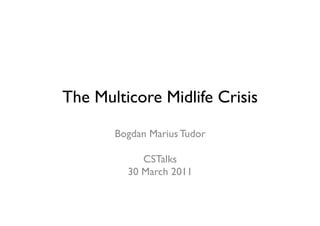
The Multicore Midlife Crisis and Coping with Slow Memory
- 1. The Multicore Midlife Crisis Bogdan Marius Tudor CSTalks 30 March 2011
- 2. Outline • The Memory Problem • Do We Need All These Cores? • Tomorrow’s Multicore • Research Perspective 5/4/11 2
- 3. Remember Single Core? Wikipedia 5/4/11 3
- 4. My Next Processors 4000 3000 Cache Size [kB] 2000 1000 0 66 200 1000 2250 1600 2400 2400 MHz MHz MHz MHz MHz MHz MHz Apr-94 Apr-98 Nov-01 May-04 Jul-06 Jul-08 Mar-11 5/4/11 4
- 5. My Next Processors 4000 3000 Cache Size [kB] 2000 1000 0 66 200 1000 2250 1600 2400 2400 MHz MHz MHz MHz MHz MHz MHz Apr-94 Apr-98 Nov-01 May-04 Jul-06 Jul-08 Mar-11 5/4/11 5
- 6. So What? Yeap, they improved the cache size. Do I care? The interesting part is why they did it. 5/4/11 6
- 7. The Memory Problem • Moore’s Law: the number Processor of transistors double Core Core Core Core every 18 months – Singlecore: new transistors = faster speed – Multicore: new transistors Cache = more cores • Memory speed increase Memory does not obey Moore’s Law! 5/4/11 7
- 8. The Memory Problem • Problem: More cores compete for same slow memory! • Implications: IF IF ID Queue ID ID X Stalled! M access to cache or RAM W J 5 cycles L > 100 cycles 5/4/11 8
- 9. The Memory Problem • Problem: More cores compete for same slow memory! • Solution: Increase cache size J – Maintain cache hit rate • 2x cache hit rate requires 4x cache size • Exponential increase in #transistors need – Cache coherence overhead 5/4/11 9
- 10. Increasing Cache Size Not practical! B. M. Rogers et al. Scaling the bandwidth wall: challenges in and avenues for CMP scaling. ISCA 2009 5/4/11 10
- 11. Other Approaches • Improve memory speed – Slow, power-hungry and error-prone • Better caching • Improve memory bandwidth – Latency tradeoff • Prefetch – Mixed blessings • Allow more in-flight requests 5/4/11 11
- 12. Do We Need All These Cores? • Average utilization: < 20% • We don’t have too many parallel apps • We just have enough compute power • Until you try to encode an HD video – Star Trek holodecks: not there yet • CPU vendors still have to make a living 5/4/11 12
- 13. Tomorrow’s Multicore Intel 5/4/11 13
- 14. Tomorrow’s Multicore • Intel Core i3, i5, i7 – Video is integrated into CPU – Must balance sequential and parallel performance – Lower energy requirements than prev. generations • Heterogeneous cores – Many, slow, good at floating points – Some general purpose cores – “Combine” cores into super-cores • Must live with the memory problems 5/4/11 14
- 15. Tomorrow’s Multicore • The number of cores is becoming less important – They can’t keep increasing them – i3, i5, i7: how many cores each? 5/4/11 15
- 16. Tomorrow’s Multicore Wikipedia 5/4/11 16
- 17. Tomorrow’s Multicore • The number of cores is becoming less important – They can’t keep increasing them – i3, i5, i7: how many cores each? • Important is what the system provides – FLOP intensive: GPU-style cores – I/O intensive: FAWN (CMU) – Memory intensive: Opteron/Xeon NUMA servers 5/4/11 17
- 18. A Research Perspective • Coping with heterogeneity is hard – Different degrees of parallelism have different sequential executions speeds – Many tradeoffs: Speed vs. Energy vs. Memory intensity vs. I/O intensity • Need models for heterogeneity – Understand the cost of the applications in terms of FLOPS, INTOPS, memory, I/O etc. • Silver lining: stick to sequential apps (?) 5/4/11 18
- 19. A Research Perspective • Coping with slow memory • Need to improve data locality by orders of magnitude • Compiler support, auto-tunners etc. • Space-efficient data types: • HOT area in algo & systems • Bloom filters: NSDI’10: 3 papers! • Succinct data structures: STOC’08-STOC’10 • Cache oblivious algorithms 5/4/11 19
- 20. A Research Perspective • Software-helped cache coherence – Or go without it J • Renounce some programming patterns • Java initializes all objects to some value… • Rethink those hash tables • Go for approximate solutions – It’s better if you can provide error bounds 5/4/11 20
- 21. Discussion Thank you for your attention 5/4/11 21
